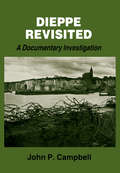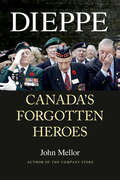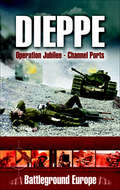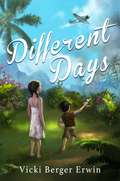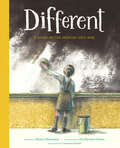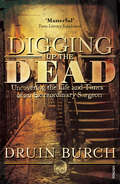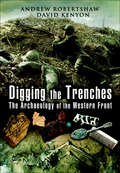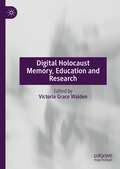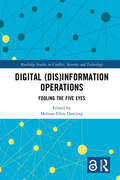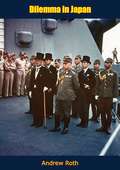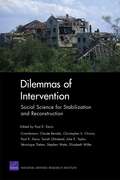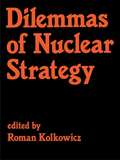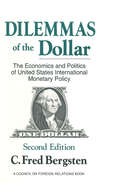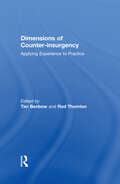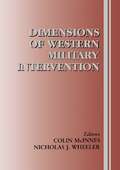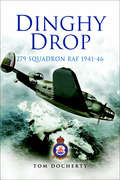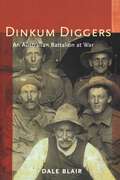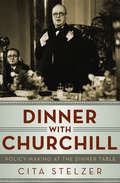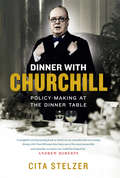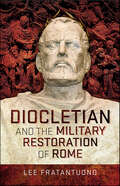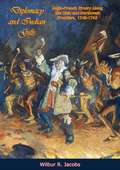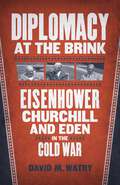- Table View
- List View
Dieppe Revisited: A Documentary Investigation (Studies in Intelligence)
by John P. CampbellThis book reappraises the ill-fated raid named operation Jubilee, focusing on aspects such as naval and air operations in the Channel, signals, radar intelligence, agents and deception. It draws from official archives, both German and Allied. From these voluminous but fragmented records, many of which have been destroyed, classified or lost, the book aims to thread the evidence together.
Dieppe: Canada's Forgotten Heroes
by John MellorThis WWII historical memoir chronicles the Canadian-led raid on a Nazi-occupied port in Northern France, as well as capture and escape from POW camps. Gripping in its intensity and detail, John Mellor&’s account of the doomed raid on Dieppe, France, in 1942 combines authoritative research with his own firsthand experience. Examining the debate surrounding this tactical failure, Mellor also puts the reader in the landing craft and on the beaches with individual Canadian soldiers. Dieppe recounts the terrible deaths of 807 Canadians and the damage to 1,946 survivors whose subsequent march to German prisoner-of-war camps is nearly as tragic as the raid itself. Mellor writes candidly about the survival tactics, the successful tunnel escapes, and the heroism of nearly three years in appalling captivity, including the desperate &“death marches&” the prisoners endured.
Dieppe: Operation Jubilee—Channel Ports (Battleground Europe)
by Tim SaundersA comprehensive history of the Allied attack on German-occupied France during World War II, examining its planning, execution, and failure. In 1942, with the outcome of the war very much in the balance, there was a pressing need for military success on mainland Europe. Churchill ordered Admiral Lord Mountbatten&’s Combined Operations HQ to take the war to the Germans. The Canadians were selected for the Dieppe raid, which, while a morale raiser, was a disaster. Over 3,000 men were lost. This authoritative account looks at the planning, execution and analyses the reasons for failure.
Dietrich Bonhoeffer's Letters and Papers from Prison A Biography
by Martin E. MartyFor fascination, influence, inspiration, and controversy, Dietrich Bonhoeffer's Letters and Papers from Prison is unmatched by any other book of Christian reflection written in the twentieth century. A Lutheran pastor and theologian, Bonhoeffer spent two years in Nazi prisons before being executed at age thirty-nine, just a month before the German surrender, for his role in the plot to kill Hitler. The posthumous Letters and Papers from Prison has had a tremendous impact on both Christian and secular thought since it was first published in 1951, and has helped establish Bonhoeffer's reputation as one of the most important Protestant thinkers of the twentieth century. In this, the first history of the book's remarkable global career, National Book Award-winning author Martin Marty tells how and why Letters and Papers from Prison has been read and used in such dramatically different ways, from the cold war to today. In his late letters, Bonhoeffer raised tantalizing questions about the role of Christianity and the church in an increasingly secular world. Marty tells the story of how, in the 1960s and the following decades, these provocative ideas stirred a wide range of thinkers and activists, including civil rights and antiapartheid campaigners, "death-of-God" theologians, and East German Marxists. In the process of tracing the eventful and contested history of Bonhoeffer's book, Marty provides a compelling new perspective on religious and secular life in the postwar era.
Different Days
by Vicki Berger ErwinTwelve-year-old Rosie is fiercely proud to be an American, and has a happy life with her family in their comfortable home in sunny Honolulu, Hawaii.Then, on the morning of December 7, 1941, Pearl Harbor is bombed and everything changes.Rosie's parents, both of German descent -- but American citizens who have lived in Hawaii nearly all their lives -- are immediately rounded up by the military. Though they've done nothing wrong, they are interrogated as German spies and imprisoned, and all the family's possessions are seized. Within days, Rosie and her brother are abandoned and homeless. A relative begrudgingly takes them in until their beloved aunt (who was also rounded up, but released) comes for them. Even then, the children's once-idyllic lives are filled with darkness and discrimination as they can only wait -- and hope -- for their parents' safe return.Based on true events, Different Days tells the story of a little-known aspect of World War II: the Internment of German Americans.
Different: A Story of the Spanish Civil War
by Mónica MontañésA resonant, captivating book about a brother and sister caught in a dark chapter of world history.Between 1936 and 1939, a civil war raged across Spain. For almost three years, ordinary citizens lived in fear of bombs dropping from the sky. When fascist dictator Francisco Franco declared victory, he began to persecute everyone who had once opposed him. Spain became a country of secrets, where anyone who was different was in danger.Different explores this turbulent period through the voices of seven-year-old Socorro and nine-year-old Paco. Because Papa has fled Spain due to his political beliefs, the siblings and their mother must hide the truth in order to survive. Paco is always hungry, and Socorro is never good enough for her teachers at school. But they can&’t ask for more food or better treatment: someone might find out who they are, or—worse—why their father isn&’t home anymore. At last a letter from Father arrives, with a chance for their family to reunite in Venezuela …Dramatic oil-pastel illustrations and poignantly chosen words express the emotions of two children coming of age in a time of extremism and fear. Based on the author&’s family history, this middle grade story is a stirring depiction of the Spanish Civil War, its tragic aftermath, and the timeless struggle for freedom from political violence.
Digging Up the Dead: Uncovering the Life and Times of an Extraordinary Surgeon
by Druin BurchA tearaway young man from Norfolk, Astley Cooper (1768-1841) became the world's richest and most famous surgeon. Admired from afar by the Brontës and up close by his student Keats, his success was born of an appetite for bloody revolutions. He set up an international network of bodysnatchers, won the Royal Society's highest prize and boasted to Parliament that there was no one whose body he could not steal. Experimenting on his neighbours' corpses and the living bodies of their stolen pets, his discoveries were as great as his infamy. Caught up in the French Revolution, and in attempts to bring radical democracy to Britain, Cooper nevertheless rose to become surgeon to royals from the Prince Regent to Queen Victoria. Setting the past against his own reactions to autopsies and operations, hospitals and poetry, Burch's Digging Up the Dead is a riveting account of a world of gothic horror as well as fertile idealism.
Digging the Trenches: The Archaeology of the Western Front
by Andrew Robertshaw David KenyonThis comprehensive, illustrated survey of the latest in battlefield archaeology reveals &“intimate insight into the realities of life&” during WWI (Current Archaeology).Modern methods of archaeological, historical, and forensic research have transformed our understanding of the Great War. In Digging the Trenches, battlefield archaeologists Andrew Robertshaw and David Kenyon introduce the reader to this exciting new field and explore many of the remarkable projects that have been undertaken.Robertshaw and Kenyon show how archaeology can be used to reveal the positions of trenches, dugouts and other battlefield features, as well as what life on the Western Front was really like. They also show how individual soldiers are coming into focus as forensic investigation is so highly developed that individuals can be identified and their fates discovered.&“An excellent introduction to the subject…Digging the Trenches is essential reading.&”—Gary Sheffield, Military Illustrated&“What a splendid book this is.&”—Neil Faulkner, Current Archaeology
Digital Holocaust Memory, Education and Research
by Victoria Grace WaldenThis book explores the diverse range of practical and theoretical challenges and possibilities that digital technologies and platforms pose for Holocaust memory, education and research. From social media to virtual reality, 360-degree imaging to machine learning, there can be no doubt that digital media penetrate practice in these fields. As the Holocaust moves beyond living memory towards solely mediated memory, it is imperative that we pay critical attention to the way digital technologies are shaping public memory and education and research. Bringing together the voices of heritage and educational professionals, and academics from the arts and humanities and the social sciences, this interdisciplinary collection explores the practicalities of creating digital Holocaust projects, the educational value of such initiatives, and considers the extent to which digital technologies change the way we remember, learn about and research the Holocaust, thinking through issues such as ethics, embodiment, agency, community, and immersion. At its core, this volume interrogates the extent to which digital interventions in these fields mark an epochal shift in Holocaust memory, education and research, or whether they continue to be shaped by long-standing debates and guidelines developed in the broadcast era.
Digital: Fooling the Five Eyes (Routledge Studies in Conflict, Security and Technology)
by Melissa-Ellen DowlingThis book offers an interdisciplinary insight into the key debates around information warfare in the digital age and argues that transnational cooperation can mitigate the threat.States and societies are increasingly vulnerable to cyber-enabled information operations. From efforts to divide nations, undermine public policy, manipulate elections, and generate social discord, malign actors use the online realm to wreak havoc on our offline lives. The book explores the digital disinformation dilemma that confronts liberal democracies, reflecting on shared socio-political challenges and solutions to contemporary information operations amongst the Five Eyes states and beyond. The work aims to generate a holistic human-centric perspective on the challenges of digital (dis)information operations through interdisciplinary insight into shared challenges and solutions to contemporary information warfare. Together, these perspectives enable us to more effectively identify opportunities to address the challenge and increase the potential to enrich international collaborative efforts to safeguard liberal democracies from threats to their information environments.This book will be of much interest to students of information warfare, intelligence studies, foreign policy and International Relations.Chapter 1 of this book is freely available as a downloadable Open Access PDF at http://www.taylorfrancis.com under a Creative Commons Attribution-Non Commercial-No Derivatives (CC-BY-NC-ND) 4.0 license.
Dilemma in Japan
by Andrew RothThe author of this book believes that certain Americans and Englishmen favor a peace formula for Japan which will provide only for a temporary truce. Just as German militarists and their industrial supporters were left in power after the First World War, in the same manner these men would leave the Japanese Emperor and his imperialist partners off control of Japan after this war. Believing that most Americans want permanent peace in spite of the cost, Mr. Roth provides a forceful analysis of the alternatives which face us—and the Japanese people.He shows first what we can expect from a defeated Japan if we follow this expedient but short-sighted policy of leaving the government in the hands of the so-called “moderates.” He points out that such a procedure would rule out the reconstruction of Japan on a democratic basis, for it would maintain in power the leading industrial giants, the Zaibatsu, of whom the greatest is the Emperor. These, combined with the semi-feudal landlords, of whom Hirohito is also the leader, have always followed a policy of economic imperialism, whether by means of military conquest or by the subtler methods of the “moderates.”This book is an honest warning by a keen analyst of Far Eastern affairs. We must realize before it is too late that we are headed toward disaster if we court the status quo in Japan. Here it is clearly demonstrated that a policy of appeasing the “moderates” can only end at another Pearl Harbor.
Dilemmas of Intervention
by Paul K. DavisGovernments intervening in post-conflict states find themselves beset with numerous challenges and profound dilemmas: It is often unclear how best to proceed because measures that may improve conditions in one respect may undermine them in another. This volume reviews and integrates the scholarly social-science literature relevant to stabilization and reconstruction, with the goal of informing strategic planning at the whole-of-government level.
Dilemmas of Nuclear Strategy
by Roman KolkowiczThis volume reflects the research and discussions for the Bellagio Conference, with a spcial emphasis on the distinct perspective introduced by the Europeans on the issues of superpower strategic relations in general and on MAD and SDI in particular. Their views are shaped by concerns on how these broader issues might affect their own national security interests.
Dilemmas of the Dollar: Economics and Politics of United States International Monetary Policy
by C. Fred BergstenAn examination of the role of the dollar in the global financial system which presents a long-term historical perspective on the international monetary system in this century. The main focus is on the evaluation of the global financial system in the post-war period.
Dimensions of Counter-insurgency: Applying Experience to Practice
by Tim Benbow and Rod ThorntonThe once-neglected study of counter-insurgency operations has recently emerged as an area of central concern for Western governments and their military organizations. While counter-insurgency represents a hugely challenging form of contemporary warfare, there exists a considerable body of experience that offers assistance in the form of examples of
Dimensions of Western Military Intervention
by Nicholas J. Wheeler Colin McINNESMilitary intervention to protect civilians in danger has emerged as a key challenge for the West. This book explores the West's reaction to these challenges and some of the limits on its actions.
Dinghy Drop: 279 Squadron RAF, 1941–46
by Tom DochertySeptember 1941 approval was given for the formation of two long-range Air-Sea Rescue squadrons. No 279 Squadron was formed at Bircham Newton in Norfolk. In the period leading up to the formation of the squadron there had been much work done in relation to air-dropped survival equipment such as the Lindholme Dinghy Dropping Gear, the Bircham Barrel and the Thornaby Bag. These contained such items as water, food, first-aid kits and distress signals. 279 was the first squadron to employ the airborne lifeboat, which was carried beneath the bellies of the portly Hudson. In January 1942 a practical boat, fitted with oars, sails and engines was put into production with the intention of slinging it under the bomb bay of the Hudson and to drop it by parachute. In October 1944 the Squadron re-equipped with Warwick Mk I aircraft moved to Thornaby in the NE of England. By now its ASR net was cast wide and there were detachments at Tain, Fraserburgh, Wick and Banff (all in northern Scotland) and Reykjavik.
Dinkum Diggers: An Australian Battalion at War
by Dale James BlairTall, sun-bronzed, hardy. Resourceful, independent, egalitarian. Scornful of authority, loyal to their mates. These mythical characteristics of the Anzac 'diggers' are central to our idea of what it is to be Australian. But did the soldiers themselves fit the stereotype? How closely does the myth match the reality? This penetrating study strips away celebratory generalisations and measures the Anzac legend against the actual experiences of one battalion that fought at Gallipoli and on the Western Front in World War I. The diaries and letters written by soldiers of the 1st Battalion reveal attitudes, insights, comments and criticisms that qualify and even contradict the Anzac legend. In Dinkum Diggers, Dale James Blair compares these first-hand accounts by front-line infantrymen with unit diaries, operational records, service and repatriation records, as well as with interviews with family members and statistical analysis, to present a well-rounded picture of the complexities of the 1st Battalion's experience. By narrowing the focus of Australian war experience to a single battalion, he demonstrates nuances and subtleties, showing how the men viewed and reacted to their own officers and how both officers and men behaved in combat. He follows these war-damaged soldiers into civilian life, where they mostly kept quiet as conservative forces worked to enshrine and sanitise Australia's sacrifice. This book makes a notable contribution to revisionist studies about World War I. It is a patient, thorough and scholarly demolition job on the Anzac legend, a reality check on back-slapping triumphalism and the glorification of war.
Dinner with Churchill: Policy-Making at the Dinner Table
by Cita StelzerA colorful and eloquent look at Churchill, with fascinating new insights into the food he ate, the Champagne he loved, and the important guests he charmed. This delectable volume is a sumptuous and intellectual treat.A friend once said of Churchill: "He is a man of simple tastes; he is quite easily satisfied with the best of everything." But dinners for Churchill were about more than good food, excellent champagnes and Havana cigars."Everything" included the opportunity to use the dinner table both as a stage on which to display his brilliant conversational talents, and an intimate setting in which to glean gossip and diplomatic insights and to argue for the many policies he espoused over a long life. In this riveting, informative and entertaining book, Stelzer draws on previously untapped material, diaries of guests, and a wide variety of other sources to tell of some of the key dinners at which Churchill presided before, during and after World War II.
Dinner with Churchill: Policy-Making at the Dinner Table
by Cita Stelzer"A delightful and delicious tribute to Churchill's heroic appetite for wining, dining and politicking" - Ben Macintyre, author of Operation Mincemeat. A friend once said of Churchill "He is a man of simple tastes; he is quite easily satisfied with the best of everything." But dinners for Churchill were about more than good food, excellent champagnes and Havana cigars. "Everything" included the opportunity to use the dinner table both as a stage on which to display his brilliant conversational talents, and an intimate setting in which to glean gossip and diplomatic insights, and to argue for the many policies he espoused over a long life. In this riveting, informative and entertaining book Cita Stelzer draws on previously untapped archival material, diaries of guests, and a wide variety of other sources to tell of some of the key dinners at which Churchill presided before, during and after World War II - including the important conferences at which he used his considerable skills to attempt to persuade his allies, Franklin Roosevelt and Joseph Stalin, to fight the war according to his strategic vision. With fascinating new insights into the food he ate, the champagnes he loved, as well as original menus, seating plans and unpublished photographs, Dinner with Churchill is a sumptuous treat. The next best thing to being there yourself.
Dinner with Churchill: Policy-Making at the Dinner Table
by Cita Stelzer"A delightful and delicious tribute to Churchill's heroic appetite for wining, dining and politicking" - Ben Macintyre, author of Operation Mincemeat. A friend once said of Churchill "He is a man of simple tastes; he is quite easily satisfied with the best of everything." But dinners for Churchill were about more than good food, excellent champagnes and Havana cigars. "Everything" included the opportunity to use the dinner table both as a stage on which to display his brilliant conversational talents, and an intimate setting in which to glean gossip and diplomatic insights, and to argue for the many policies he espoused over a long life. In this riveting, informative and entertaining book Cita Stelzer draws on previously untapped archival material, diaries of guests, and a wide variety of other sources to tell of some of the key dinners at which Churchill presided before, during and after World War II - including the important conferences at which he used his considerable skills to attempt to persuade his allies, Franklin Roosevelt and Joseph Stalin, to fight the war according to his strategic vision. With fascinating new insights into the food he ate, the champagnes he loved, as well as original menus, seating plans and unpublished photographs, Dinner with Churchill is a sumptuous treat. The next best thing to being there yourself.
Diocletian and the Military Restoration of Rome
by Lee FratantuonoThe third century AD was one of unprecedented crisis and chaos for the Roman Empire. Nightmares both internal and external threatened to spell the end of Rome’s thousand-year history. Diocletian was born either a slave or a freedman, and he grew up to become the savior of Rome in her hour of crisis, a powerful military and political leader who transformed the Roman Empire from a hotbed of unceasing strife and turmoil into a renewed, restored, revivified and stable polity. His more than twenty years of power were marked by the ill-fated Great Persecution of the Christians, an undertaking that would prove to be one of the less successful initiatives of his reign, even as in its own way it helped to pave the way for the coming of an equally famous, successful emperor in the person of Constantine the Great. The present study seeks to provide an introduction to the life and times of Diocletian for the general reader, offering a balanced portrait of an immensely talented man in a time of trial and tumult, an accomplished emperor who knew when it was time to retire to his gardens.
Diplomacy and Indian Gifts: Anglo-French Rivalry Along the Ohio and Northwest Frontiers, 1748-1763 (Eastern Woodlands History And Culture Ser.)
by Wilbur R. JacobsThis study of gifts to the Indians is an attempt to illuminate a hitherto almost obscure factor in the Colonial westward movement. These “presents,” comprising such eighteenth-century items as fabrics, hardware, munitions, food, toys, jewelry, clothing, wampum, and liquors, were a potent factor in the complex diplomatic history of Indian politics along the old Northwest frontier. Thousands of pounds sterling were expended both by the French and by the English in observing this old Indian custom that was so necessary to Indian diplomacy. Indeed, the civilizing influence of this concomitant of Western culture reached ahead of the fur trade far into the wilderness to the Mississippi Valley. These so-called presents also served as a measure of compensation for the vast areas of virgin forest that were bought by the English. The French competed with the British in securing the friendship of the powerful Indian confederacies, which, even as late as 1750, held the balance of power in North America. During the years 1748-1763, it became the policy of the colonies bordering the Ohio and Northwest frontiers to “brighten the chain of friendship” by giving presents to such influential “nations” as the members of the Iroquoian confederacy. Moreover, in some cases the Indians became so accustomed to these frequent outlays of free merchandise that they came to be almost completely dependent upon European goods.—Wilbur R. Jacobs
Diplomacy at the Brink: Eisenhower, Churchill, and Eden in the Cold War
by David M. WatryA groundbreaking new study of Anglo-American relations during the Cold War, Diplomacy at the Brink argues for a reevaluation of Dwight D. Eisenhower's foreign policy toward allies and enemies alike. Contrary to his reputation as a level-headed moderate, the Eisenhower who emerges in David M. Watry's exhaustively researched book is a conservative ideologue, a leader whose aggressively anti-Communist and anticolonialist foreign policies represented a major shift away from the containment policy of the Truman presidency. Watry contends that Eisenhower worked closely with John Foster Dulles to engage in aggressive brinksmanship that diametrically opposed Winston Churchill's diplomacy of "peaceful coexistence." At a time when British economic interests favored cooperation with China, Eisenhower planned nuclear war against it; when Anthony Eden considered Gamal Abdel Nasser a Soviet agent and invaded Egypt, Eisenhower supported Arab nationalism and used economic and political blackmail to force Britain to withdraw. Such stances fractured the "special relationship" between America and Great Britain and played a vital role in the dissolution of the British Empire. Watry's thorough examination of the important clash of U.S.-U.K. foreign policy demonstrates that America's new anti-colonial policies and the unilateral use of American power against perceived Communist threats put Eisenhower and Dulles on a collision course with Churchill and Eden that rocked the world.
Diplomatic Counterinsurgency
by Philippe Leroux-MartinWar does not stop when the armed conflict ends. This compelling eyewitness account of a key political crisis in Bosnia and Herzegovina in 2007 demonstrates how interventions from foreign powers to end armed conflict can create new forms of conflict that are not only as determined and resilient, but can lead groups to challenge the power of fragile states through political and legal means. Countering such challenges is an integral but often ignored part of peace processes. How do these nonviolent wars evolve? How can the power of fragile states be challenged through nonviolent means in the aftermath of armed conflict? And what is the role of diplomacy in countering such challenges? This book offers key insights for policy makers dealing with fragile states who seek answers to such questions.
